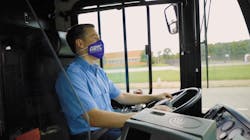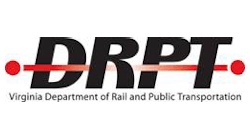GRTC lands state grant to study zero-fare impacts
GRTC will remain fare free while a three-year – possibly longer – study commences to evaluate the impacts of zero fares on riders and communities served by local transit. The study will take place July 1, 2022 through June 30, 2025, supported by an $8 million state grant from the Virginia Department of Rail and Public Transportation with matching funds from the city of Richmond, Va., and Virginia Commonwealth University.
GRTC suspended fare collections on March 19, 2020, in order to limit close contact between operators and passengers at the farebox with plans to remain zero fare using federal COVID-19 relief dollars until June 30, 2022. Under this state grant, both GRTC fixed route (local, express, and Pulse) and paratransit (CARE, but not CARE On-Demand) services will remain zero fare to study the benefits, impacts and sustainability of zero fares, as well as alternative fare collection methods.
“Pre-COVID, GRTC collected approximately $5 million annually from local bus riders commuting to or from essential jobs – many of whom were living at or below poverty. Transit fares maintained a very real barrier keeping these members of our community from accessing critical resources such as food, health care, education and better paying jobs. Under Zero Fares, our most vulnerable neighbors have no longer been forced to choose between the cost of transportation and the cost of food or medicine. They now have ready access to these essential resources through transit service, and they have the opportunity to spend their hard-earned dollars directly at the grocery store, the doctor’s office or the pharmacy instead of the GRTC farebox – putting those dollars directly back into the local economy,” said GRTC CEO Julie Timm.
Before the pandemic, ridership on GRTC local bus routes made up approximately 70 percent of total ridership compared to express bus riders making up only five percent of ridership. The majority of local riders have annual household incomes of less than $25,000 with a quarter of riders making under $10,000 a year. However, they were paying about $20 per week or more per person to ride the bus compared to most express riders who typically had bus passes fully subsidized by their employers. Pulse ridership, about 25 percent of all GRTC trips, was about 50 percent local bus riders pre-COVID.
As of November 2021, GRTC’s local ridership exceeds pre-pandemic ridership (up nearly 10 percent compared to ridership data in November 2019). This is an unprecedented recovery when compared to national trends. A recent national study published by APTA attributes GRTC’s sustained ridership and quick recovery to two key factors: the 2018 system redesign that connected riders to jobs as well as the ongoing zero fare operations that broke down barriers between communities and access to essential resources.
“To reduce barriers to transit for low-income individuals, the TRIP Zero Fare pilot will allocate $8 million in funding over the next three years to support system-wide zero fare for GRTC,” stated Jennifer Mitchell, director of the Department of Rail and Public Transportation. “DRPT evaluated and prioritized projects based on CTB criteria and recommended funding to GRTC based on the defined and quantifiable measures of success, the collaborative development environment as evidenced by the support of various regional partners and local organization, and the ease of implementation. These pilot projects will provide increased access to our essential workforce who rely on public transportation for employment, education, healthcare and basic human needs."
The net budget for GRTC’s Zero Fare program over three years is $20.4 million after removing more than $1.2 million annually in fare collection costs. The DRPT $8 million grant steps down over three years from $4.5 million, to $2.5 million to $1 million respectively. City of Richmond Mayor Stoney committed financial support for the three-year study period; however, GRTC will be actively seeking partnerships with other institutions and businesses who benefit from transit service to reduce the funding commitment required by the City. The first of these commitments is already in place thanks to Virginia Commonwealth University and includes $1.3 million a year for the three-year period.
GRTC’s successful grant application to DRPT included resolutions or statements of support from the City of Richmond (both Mayor and City Council), Virginia Commonwealth University, the Greater Washington Partnership, the Richmond Regional Transportation Planning Organization (RRTPO) Policy Board, and GRTC’s Board of Directors. GRTC will continue to work with each of these partners and others in the RVA region to assess the costs of fare collections against the revenues collected and the impacts on riders. The future of fare collections at GRTC will entirely depend on the results of the upcoming studies on fare impacts and fare technology solutions as well as GRTC’s ability to foster and maintain sustainable, dedicated funding partnerships with each of the supporting members after the pilot ends in 2025.



